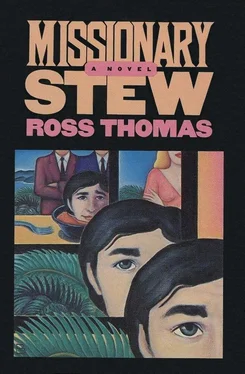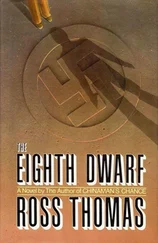Ross Thomas - Missionary Stew
Здесь есть возможность читать онлайн «Ross Thomas - Missionary Stew» весь текст электронной книги совершенно бесплатно (целиком полную версию без сокращений). В некоторых случаях можно слушать аудио, скачать через торрент в формате fb2 и присутствует краткое содержание. Город: New York, Год выпуска: 1983, ISBN: 1983, Издательство: Simon & Schuster, Жанр: Политический детектив, на английском языке. Описание произведения, (предисловие) а так же отзывы посетителей доступны на портале библиотеки ЛибКат.
- Название:Missionary Stew
- Автор:
- Издательство:Simon & Schuster
- Жанр:
- Год:1983
- Город:New York
- ISBN:978-0-671-49363-9
- Рейтинг книги:3 / 5. Голосов: 1
-
Избранное:Добавить в избранное
- Отзывы:
-
Ваша оценка:
- 60
- 1
- 2
- 3
- 4
- 5
Missionary Stew: краткое содержание, описание и аннотация
Предлагаем к чтению аннотацию, описание, краткое содержание или предисловие (зависит от того, что написал сам автор книги «Missionary Stew»). Если вы не нашли необходимую информацию о книге — напишите в комментариях, мы постараемся отыскать её.
Missionary Stew — читать онлайн бесплатно полную книгу (весь текст) целиком
Ниже представлен текст книги, разбитый по страницам. Система сохранения места последней прочитанной страницы, позволяет с удобством читать онлайн бесплатно книгу «Missionary Stew», без необходимости каждый раз заново искать на чём Вы остановились. Поставьте закладку, и сможете в любой момент перейти на страницу, на которой закончили чтение.
Интервал:
Закладка:
“So,” the Emperor-President said. “You are leaving us.”
“I hope so.”
“Some say you are French; some say American. What do you say?”
“I was both for a time. Now I’m American.”
“How could you be both?”
“A matter of papers.”
“Documents?”
“Yes.”
“Ahhh.”
The Emperor-President closed his eyes and seemed to nod off for a moment or so. He was a chunky man in his early fifties with a big stomach that bounced and rolled around underneath a long white cotton robe. The robe resembled a nightgown, and Citron thought it looked both cool and eminently practical. The Emperor-President opened his eyes, which seemed a bit inflamed, picked his nose, wiped his finger somewhere on the throne, and then beckoned Citron. “Come closer.”
Citron moved closer.
“Closer still.”
Citron took two more steps. The Emperor-President looked around suspiciously. They were alone. He beckoned Citron with a single finger. Citron leaned forward until he could smell last night’s gin. Or today’s.
I wish to send a secret message to the Presidents of France and the United States,” the Emperor-President whispered. “No one must know. No one.” He waited for Citron’s reply.
“I’m not sure,” Citron said carefully, “how soon I will be seeing them.”
The Emperor-President nodded his big head, as if that were exactly what he would expect a spy to say. “My message is brief. Tell them — tell them both that I am ready for reconciliation — on their terms.”
“I see.”
“Can you remember that?”
“Yes. I believe so.”
“Here.” The Emperor-President fumbled into the folds of the long white gown, found the pocket, and brought out a clenched fist. “Hold out your hand.”
Citron held out his hand.
“Palm up.”
Citron turned his palm up. The Emperor-President unclenched his fist. A two-carat diamond dropped into Citron’s open palm. He automatically wrapped a fist around it.
“A token,” the Emperor-President said. “A gesture.”
“A token gesture.”
“Yes. For your trouble.”
“I see.”
“You are free to go.”
“Yes. Well. Thank you.”
Citron turned and started toward the tall double doors, but stopped at the sound of the Emperor-President’s voice. “Wait.” Citron turned.
“I understand they fed you monkey today.”
Citron only nodded.
“Did you like it?”
“I ate it.”
“So did I,” the Emperor-President said and began to chuckle — a deep bass chuckle that seemed to rumble up from his belly. “We both ate monkey today,” the Emperor-President said and then went back to his chuckling. He was still at it when Citron walked through the tall double doors.
Miss Cecily Tettah counted three hundred French francs onto the plain table, picked them up, and handed them to Citron. He put them into the envelope that contained his Air France ticket to Paris and his American passport.
“How was he?” she asked. “You never said.”
“He laughed a lot.”
“Nothing else?”
“He still thinks I’m a spy.”
“Really? I thought we’d got that all sorted out. Are you still quite certain there is no one you wish us to notify in the States?”
“No. No one.”
“Not even your mother?”
Citron shook his head. “Especially not her.”
Chapter 2
It was almost a year to the day after Citron sold his diamond in Paris that Draper Haere, the money man, flew into Denver from New York. He arrived late, just before midnight. Because Haere had experienced a couple of uncomfortable rides with Denver taxi drivers in recent years, he carefully examined the man behind the wheel of the taxi at the head of the rank and was pleased to discover that he was Mexican and apparently a very sunny fellow.
Two years before when Haere had caught a taxi at Denver’s Staple-ton Airport, the driver had turned out to be a disgraced lieutenant governor from Louisiana who had taken to drink, but was now on what he called his rocky road to recovery and wanted to tell Haere all about it. The second time, almost a year later, another taxi driver had been a former Teamsters business agent from St. Louis who had been caught with his hand in the till. The former business agent was philosophical. “What the hell, Draper,” he said. “I took a chance and I got caught.” Haere sometimes wondered if taxi driving in Denver was a mystical restorative experience that somehow helped the fallen to climb back up onto the stool of redemption.
Before flying to Denver, Haere had been staying in New York at the Pierre, talking to a man who was toying with the idea of running for President — provided it didn’t cost too much — and provided his mother gave him permission. But when the man who would be President seemed incapable of making up his mind, Haere had made a date with the mother.
They had tea at the Plaza. Or rather she had a vodka martini and Haere had tea. It took only five minutes, perhaps four, for them to agree that forty-three-year-old Sonny wasn’t quite ready to be President, at least not in 1984, and probably not even in 1988. After that they spent another pleasant half hour or so talking politics.
Haere discovered she had one of those shockingly brilliant political minds that sometimes crop up in such places as Texas and Wisconsin and even Nebraska (Norris came to mind), but rarely in New York and not quite never in California. She was from West Virginia and had married steel. Big steel. When Haere told her it was too bad she couldn’t run for President herself, she had shrugged and smiled, more than a little pleased. Haere didn’t bother to call Sonny, who, he decided, would probably rather get his bad news from Mommy.
When the Mexican driver in Denver wasn’t smiling about some nice secret, he hummed to himself and seemed to feel that all conversation was superfluous. So while the driver hummed, Draper Haere stared out the cab window and remembered the Denver of his childhood and early adolescence when it had been a quiet, sleepy, strangely green town content to nestle at the base of the Rocky Mountains under the collective thumb of the banks and Colorado Fuel and Iron and Great Western Sugar. Back then, Haere recalled, lungers from the East were still coming to Denver for its air. Now nobody came for the air. If they wanted clean air, they stayed in Pittsburgh.
As always, Haere was pleased to see that nothing much had happened to the Brown Palace Hotel in the past ninety years or so — other than the new west wing they had added on in the sixties. The room prices had changed, of course, and Haere still felt uncomfortable about paying $100 or $125 or $150 a night for a room. But Haere was one of those who still compared the price of everything with what he had paid back in the economic benchmark year of 1965 — a silly, unbreakable habit that he often found extremely depressing.
The Brown Palace even had a bellhop on duty, an elderly one, who took Haere up to his room and accepted a $5 tip with polite thanks. Twenty seconds after the bellhop left, the phone rang. Haere knew it had to be the Candidate. It could be no other.
The Candidate was actually the forty-one-year-old governor-elect of California, calling from his Santa Monica house, working his phone calls west. It was now 2:00 A.M. in Washington, midnight in Denver, and 11:00 P.M. in Santa Monica. Soon the Candidate would have no one left to call but his fellow Californians.
Haere always thought of the governor-elect as the Candidate because no sooner was he elected to one office than he began lusting after the next. His name was Baldwin Veatch — which rhymed with wretch, as Haere was fond of pointing out — and beginning in his twenty-third year he had been elected in rapid succession from Los Angeles’s suspiciously liberal west side to the state assembly, the state senate, the U.S. House of Representatives, and finally the governorship of the nation’s most populous state. The White House was the only conceivable next step up, and Baldwin Veatch, not yet sworn in as governor, was already taking his first cautious preliminary soundings.
Читать дальшеИнтервал:
Закладка:
Похожие книги на «Missionary Stew»
Представляем Вашему вниманию похожие книги на «Missionary Stew» списком для выбора. Мы отобрали схожую по названию и смыслу литературу в надежде предоставить читателям больше вариантов отыскать новые, интересные, ещё непрочитанные произведения.
Обсуждение, отзывы о книге «Missionary Stew» и просто собственные мнения читателей. Оставьте ваши комментарии, напишите, что Вы думаете о произведении, его смысле или главных героях. Укажите что конкретно понравилось, а что нет, и почему Вы так считаете.












